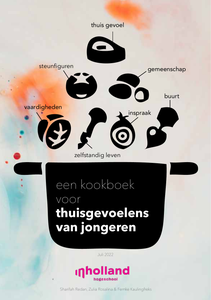De serie Transparant aanbod beschrijft het aanbod van de sector welzijn en maatschappelijke dienstverlening in transparante taal. Zo kunnen beroepskrachten in deze sector eenvoudig en duidelijk onder woorden brengen wat hun werk inhoudt en welke diensten zij leveren. Wat heeft een discipline te bieden, voor wie, met welke doelen, op welke manier en met welke beoogde resultaten?
DOCUMENT

The demographics of the homeless population in many countries are currently shifting, and this cannot be explained by the different welfare systems to be found in these countries. Nevertheless, there is some evidence that the homelessness policies of some countries are converging, and we observe a combination of decentralisation, housing first, and a taylor-made, individualised approach. However, what is interesting is the question as to what extent these policies are based on a punitive dimension or on a justice dimension.
DOCUMENT

Voor het afstemmen van zorg moeten zorgverleners informative met elkaar delen. Er is dan ook een grote diversiteit aan (nieuwe) interprofessionele overlegvormen. Maar patiëntgerelateerde informatie delen mag niet zomaar. Daarvoor gelden verschillende wetten en regels. In dit artikel zetten we ze op een rijtje.
DOCUMENT

GGZ verpleegkundigen die voor een crisisdienst werken moeten tijdens hun werk beslissingen nemen over het wel of niet delen van persoonsgegevens met ketenpartners. In de literatuur zijn randvoorwaarden gevonden voor het doorbreken van het medisch beroepsgeheim. De GGZ verpleegkundigen wisten niet of hun instelling een beleid heeft op dit gebied. Ze maken zelf per casus een inschatting, op basis van ingeschat gevaar, inschatting wat nodig is voor goede zorg en het belang van samenwerking met de ketenpartner. Die inschatting kan dus per GGZ verpleegkundige anders uitvallen. Welke gegevens dan precies gedeeld worden laten de GGZ verpleegkundige afhangen van ingeschatte relevantie van gegevens en hoe recent ze zijn. Het delen van persoonsgegevens met ketenpartners wordt niet structureel vastgelegd in dossiers. De GGZ verpleegkundigen gaan ervan uit dat ketenpartners zelf de betrokkene op de hoogte stellen.
DOCUMENT

In dit kookboek nemen we je mee in het ‘koken’ van een thuisgevoel. Dit kookboek is gericht op professionals die met jongvolwassenen werken en professionals die zich bezig houden met woonvormen gericht op jongvolwassenen. Elk recept bestaat uit een aantal elementen: – Een uitleg waarin we het recept toelichten – De hoofdingrediënten die we illustreren met uitspraken en ervaringen – Praktische TIPS zodat je dit recept direct kunt ‘koken’ – In sommige recepten vind je ook smaakmakers. Dit zijn tips of aandachtspunten die het recept naar een hoger niveau tillen
DOCUMENT

Bij het historisch schatgraven is één van de meest fascinerende vondsten het fenomeen van de veranderende tijdgeest. We kunnen tijdgeest ook ‘sociaal-culturele conjunctuur’ noemen, naar analogie van ‘economische conjunctuur’. Ik hou het op ‘tijdgeest’. Tijdgeest is een moeilijk te pakken en te verklaren verschijnsel, maar het is er niet minder werkzaam door.4 Als we spreken over een veranderde tijdgeest bedoelen we een omslag in collectieve mentaliteit. Die veranderde tijdgeest maakt dat we anders gaan denken, kijken en voelen over allerlei maatschap¬pelijke verschijnselen, en ook over welzijn, over waarden als solidariteit en gelijkheid, rechten en plichten, verantwoordelijk¬heid en maatschappelijk werk. En er spelen vragen als: wie zijn de kwetsbaren, welke taken heeft de overheid en wat moeten burgers zelf doen?
DOCUMENT

In de publieke dienstverlening gericht op de aanpak van schulden, werkloosheid en de inning van de eigen bijdrage Wet maatschappelijke ondersteuning (Wmo) 2015 en de wanbetalersregeling zijn lager opgeleiden oververtegenwoordigd. Publieke dienstverleners hebben aandacht voor deze groep maar zijn ook zoekend wat zij nodig heeft om haar weg in de verschillende voorzieningen beter te vinden. Om daar meer beelden bij te krijgen heeft het lectoraat Schulden en Incasso van het Kenniscentrum Sociale Innovatie van de Hogeschool Utrecht onderzoek gedaan. De onderzoeksvraag luidt: Welke belemmeringen ervaren specifiek lager opgeleiden bij het gebruik van publieke dienstverlening op het terrein van sociale zekerheid en de financiële kant van het gebruik van zorg en wat is de doorwerking van deze belemmeringen?
DOCUMENT

In het Utrechtse voortgezet onderwijs is vastgesteld dat er sprake is van circa honderd leerlingen die langer dan twee maanden ‘thuiszitten’. De betrokken partners – het samenwerkingsverband Sterk VO, de afdeling leerplicht van gemeente Utrecht, de jeugdgezondheidszorg en de buurtteams jeugd en gezin – geven aan deze situatie onwenselijk te vinden. Tegen deze achtergrond gaven zij een analyse te willen laten uitvoeren van deze problematiek en advies te ontvangen om hier als kernpartners slagvaardiger in te kunnen opereren. Gebruik makend van dossier analyse en kwalitaiteve interviews is dit advies tot stand gekomen.
DOCUMENT

Het Nederlands Jeugdinstituut is gevraagd goede en minder goede voorbeelden van feitenonderzoek te beschrijven, naar aanleiding van het Actieplan Verbetering Feitenonderzoek in de Jeugdbeschermingsketen, dat de gecertificeerde instellingen, de Raad voor de Kinderbescherming en Veilig Thuis in 2018 opstelden. De onderzoekers spraken daarvoor met professionals, cliënten en beleidsmakers van organisaties uit de jeugdbeschermingsketen. Het feitenonderzoek in de jeugdbescherming vraagt om verbeteringen en daar zijn mogelijkheden voor, blijkt uit de studie. Daarbij is het belangrijk dat professionals en cliënten samenwerken op basis van zo veel mogelijk gelijkwaardigheid, ondanks het gedwongen karakter van die samenwerking.
MULTIFILE

Interview met o.a. Menno van Duin. Bij een calamiteit staat de school volkomen onverwacht volop in de belangstelling, zowel bij medewerkers, leerlingen en ouders als in de pers en op sociale media. Daar moet je als school snel en adequaat op reageren. Hoe leid je de in- en externe communicatie in goede banen?
DOCUMENT
